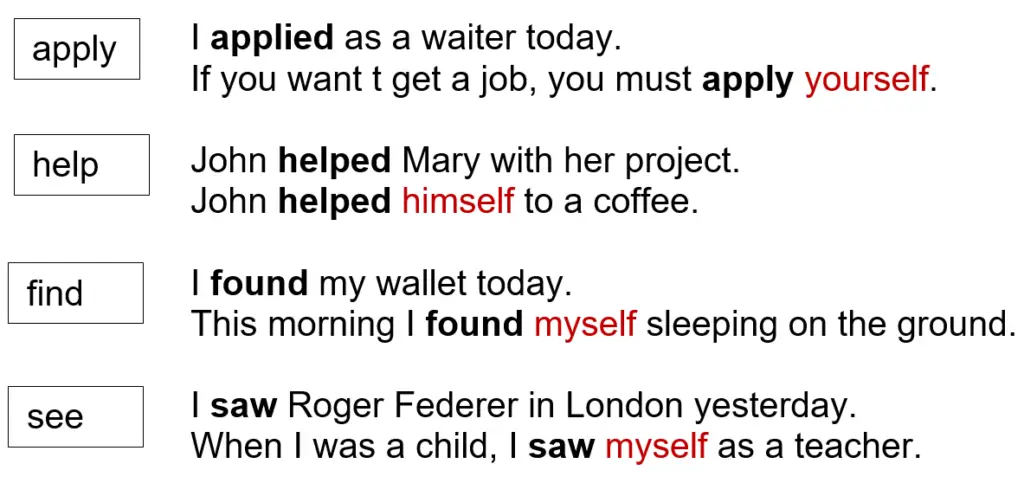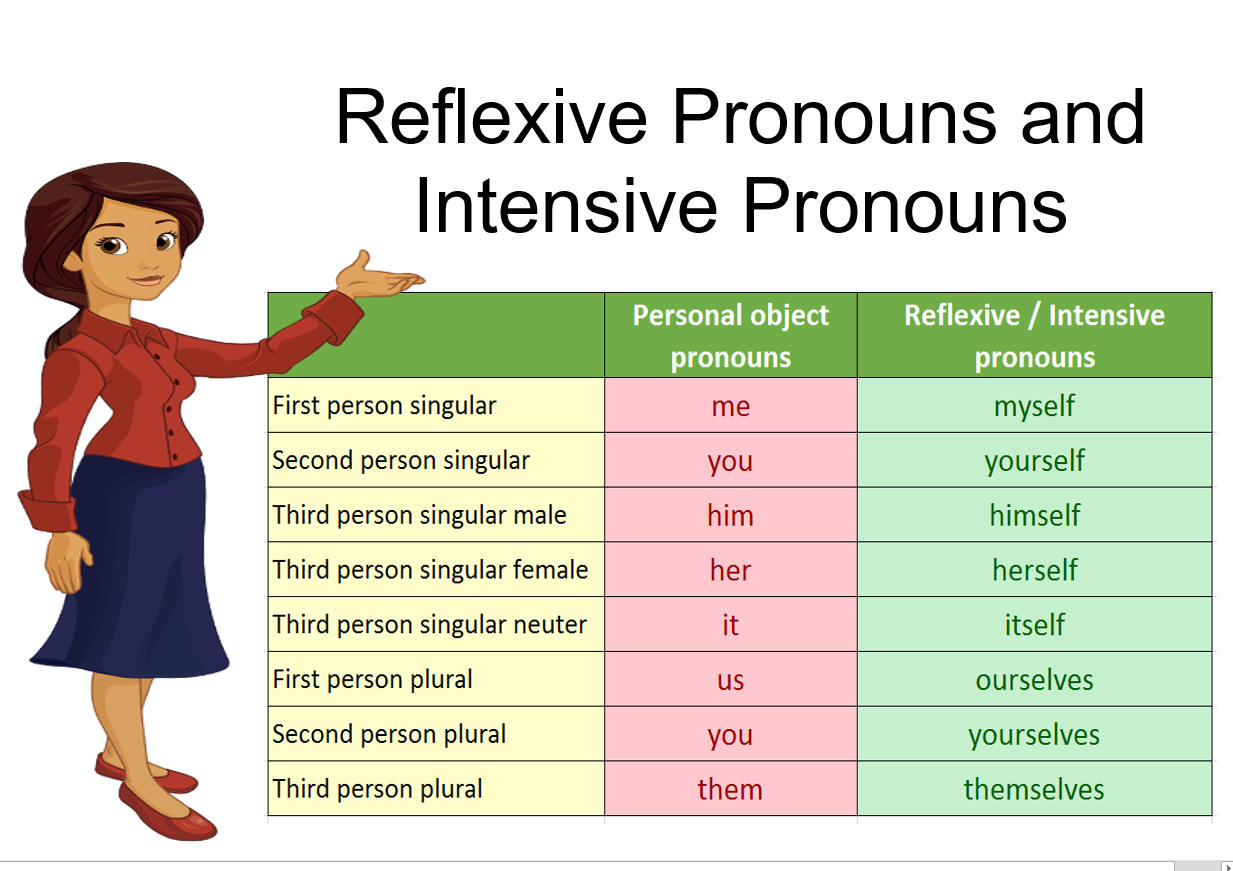Reflexive Pronouns and Intensive Pronouns in English
In this lesson, learners are going to know the difference between reflexive and intensive pronouns. You will know the reflexive and intensive pronouns differences with the provided list of example sentences.
Reflexive pronouns are objects that refer to the subject while intensive pronouns are used to emphasize the noun or pronoun. They will also learn the 8 reflexive pronouns, an intensive pronoun and how to use reflexive and intensive pronouns. In addition, an intensive pronoun is a pronoun that ends in “self” or “selves” and emphasizes the antecedent.
Watch the video here:
Introduction: Intensive and Reflexive Pronoun
When the subject and object are the same, reflexive pronouns are employed. Intensive pronouns are used to highlight the subject, implying that the subject is the only one.
I am baking Jane a cake.
I am baking her a cake. (personal pronoun)
If I would like a cake, how do we say this?
I am baking me a cake. X (personal pronoun)
I am baking myself a cake. (reflexive pronoun)
List of Reflexive pronouns / intensive pronouns
A reflexive pronoun refers to the sentence’s subject, whereas an intensive pronoun emphasizes or intensifies a noun. Nowhere are the list of reflexive and intensive pronouns that you can use in sentences.
| Personal object pronouns | Reflexive / intensive pronouns | |
| First person singular | me | myself |
| Second person singular | you | yourself |
| Third person singular male | him | himself |
| Third person singular female | her | herself |
| Third person singular neuter | it | itself |
| First person plural | us | ourselves |
| Second person plural | you | yourselves |
| Third person plural | them | themselves |
Reflexive pronouns and intensive pronouns, they are the same words but the use is very different in sentences.
List of Reflexive and Intensive Pronouns Uses in Sentences
Reflexive Pronouns Uses – 1: We use the reflexive pronouns when the subject and object are the same person. A reflexive pronoun is an object that reflects back to a subject.
Example: John is washing the car himself before going to work. (John is the subject and object)
We can use a reflexive pronoun as 3 different types of object:
a. direct object
b. indirect object
c. an object of preposition.
1 – A. Reflexive Pronoun as As a direct object
We use a reflexive pronoun as a direct object to reflect back the subject.
- Helen is cooking herself for lunch.
- The subject is Helen. (Helen is cooking)
- The object is also Helen. (Helen is cooking for Helen)
The position of a reflexive pronoun is immediately after the verb.
I am learning myself how to use the computer.
Anne is learning herself how to use the computer.
Example Sentences:
We enjoyed ourselves at the party.
Roger always looks at himself at the mirror.
1 – B. Reflexive Pronoun as an indirect object
We use a reflexive pronoun as an indirect object to reflect back the subject.
Examples:
Olivia pours herself a cup of tea every morning.
The subject is Olivia. (Olivia pours a cup of tea)
The indirect object is also Olivia. (a cup of tea is for Olivia)
And here again, the position of a reflexive pronoun is immediately after the verb.
Examples: Mike decided to reward himself with a dinner out.
1 – C. Reflexive Pronoun as an object of preposition
We use reflexive pronouns as the object of a preposition when the object is the same as the subject of the verb:
- They had to cook for themselves.
- He was feeling very sorry for himself.
The position of the reflexive pronoun is immediately after the preposition. Example:
Sometimes I consult things with myself.
She is ashamed of herself for her deeds.
Common reflexive verbs in English: Transitive Verbs
When appropriate, we can use reflexive pronouns as the object of these verbs.
| amuse, blame, cut, dry, enjoy, help, hurt, introduce, kill prepare, satisfy, teach |
We have been preparing ourselves for the sports day.
She taught herself to play the piano.
My son amused himself watching cartoons movie.
Verbs that are always reflexive
| Busy oneself, pride oneself |
While waiting for the bus, I busied myself reading the magazine. (= to pass the time)
Verbs that change their meaning when reflexive

Reflexive pronouns -common mistakes # 1: We do not use a reflexive pronoun after a preposition of place or “with” if it is obvious that the meaning is reflexive. We use a personal object pronoun.
He took his umbrella with himself. X He took his umbrella with him. /
We do not use a reflexive pronoun as a subject. We use a personal subject pronoun. Example:
James and myself went to Bangkok. X James and I went to Bangkok. /
Reflexive pronouns -common mistakes # 2: We do not use a reflexive pronoun for actions that people usually do for themselves, Examples:
- Tim showers himself every day. (wrong)
- Tim showers every day. (correct)
- Anne is ironing herself her dress. (wrong)
- Anne is ironing here dress. (correct)
- Allan is cutting himself his nails.
- Allan is cutting his nails.
Intensive Pronouns:
Intensive pronouns add emphasis to a noun or pronoun. (the antecedent). Intensive pronouns are not the object of the sentence. The subject and object are not the same person.
Dan: Are you sure Kate is coming tonight?
Me: “Yes, she herself told me.”
“herself” is emphasizing “she”. (She told me, nobody told me.). It means that Kate told me personally.
Manager: You must sign the contract yourself.
“yourself” is emphasizing “you” (You must sign the contract, nobody else.) The position of the intensive pronoun is either after the antecedent or at the end of the clause.
“By” + intensive pronouns: We use by + intensive pronouns to mean alone or without help. Example:
- My friends don’t want to go to the museum so I’ll go by myself. (= I’ll go alone)
- Anne prepared breakfast by herself. (Only Anne prepared the breakfast. Nobody helped her.)
- The woman is sitting on the bench by herself. (The woman is sitting on the bench alone.)
Reflexive and Intensive Pronouns Sentences and List of Exercises:
After you have known the ideas of the reflexive and intensive pronouns, this lesson gives you a list of sentences that you can practice and exercises.
Reflexive and Intensive Pronouns Exercises 1: Complete these sentences using the correct reflexive pronoun below.
Myself Yourselves herself himself
itself yourself ourselves themselves
- I was in a hurry, so I washed the car____________.
- You’re going to have to drive ____________to school today.
- He wanted to impress her, so he baked a cake ___________.
- Jennifer does chores ___________ because she doesn’t trust others to do them right.
- That car is in a class all by___________ .
- We don’t have to go out; we can fix dinner___________.
- You are too young to go out by___________ .
- The actors saved the local theatre money by making costumes ___________.
Reflexive and Intensive Pronouns Exercise 2: Underline the intensive pronoun inside the bracket to emphasize the subject.
- We built a garden shed by (ourselves, themselves).
- Jordan made (himself, itself) a sandwich, complete with pickles.
- I’m a little nervous about walking by (myself, himself) after dark.
- The twins are growing up fast; they’re already walking by (yourselves, themselves).
- Jennifer sewed her dress (herself, himself).
Downloadable Material
Here’s the downloadable material of Tutorial on Reflexive pronouns.
For more readings
- Adjectives Ending in ING and ED | Participle Adjectives
- ing Verbs English Lesson and Exercises – ing Forms, Spelling Rules and Grammar
- Present Simple Verb Tense | Present simple English Verb
- Modal Verb Could – Form, Use and Meaning in English
If you have any questions or suggestions about Reflexive pronouns and intensive pronouns, please feel free to leave a comment below or send us a message using our contact page.


